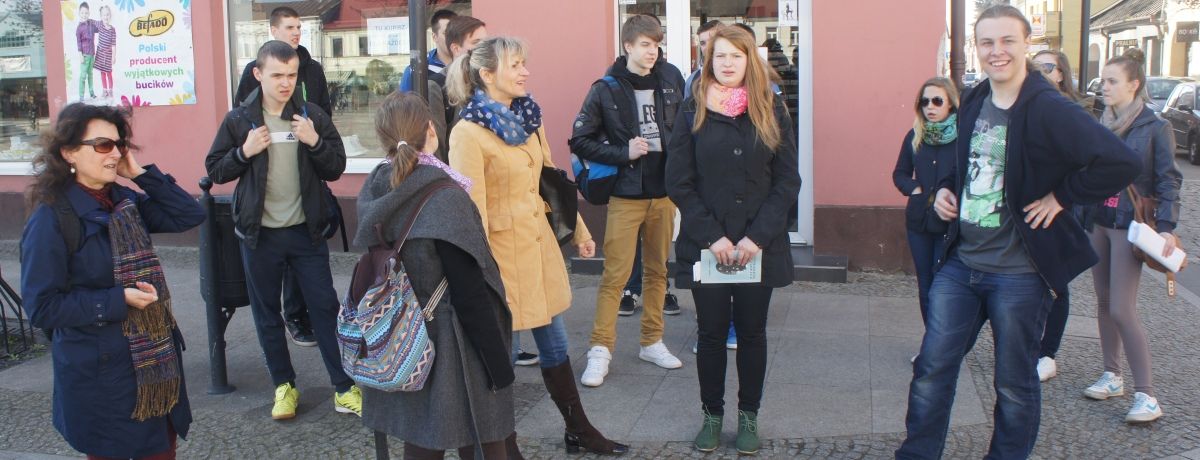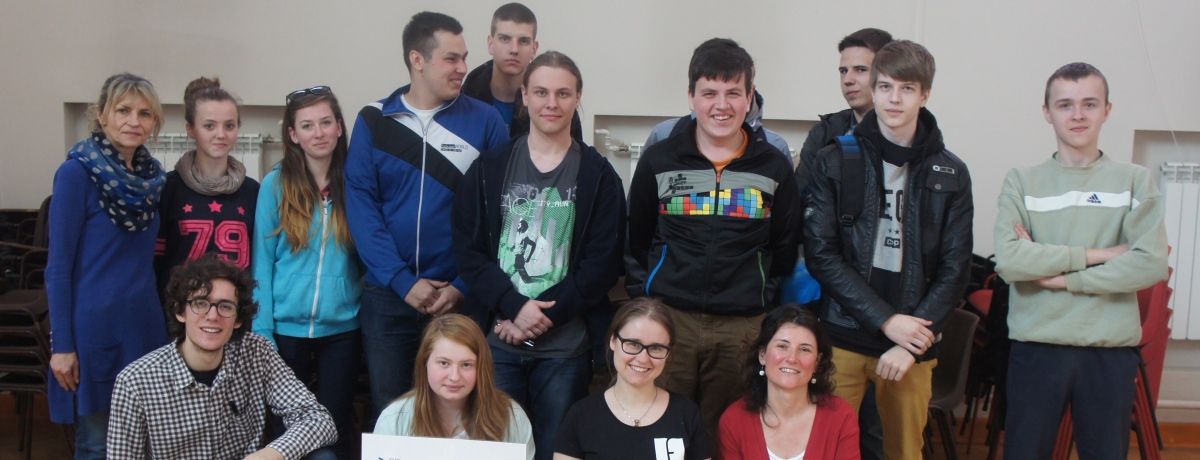| 2015 |
Skierniewice
Józef Paczkowski Vocational School Complex No 2


| 2015 |
Honorable Mention at 2015 School of Dialogue Gala
Continuing School of Dialogue in 2016
The request for authorization was filed to the Regional Police Headquarters, the Municipal Police and the City Council of Skierniewice a month before the event. The students from the vocational school in Skierniewice invited the town residents for a bike tour ride following the traces of Jews from Skierniewice, scheduled for June 8.
The tour was a part of the School of Dialogue project which took place at the vocational school in Skierniewice in Spring. During a series of workshops, students, with the help of Forum’s educators, prepared a tour in order to find traces of the Jewish residents of their town, while learning about the Jewish culture and the local history. And here in Skierniewice, there was a lot to discover. The Jewish religious community was founded in 1850 when the Warsaw-Vienna train hub was constructed in Skierniewice. In the same period of time, the Jewish cemetery was created, the funeral fraternity was established, the wooden synagogue was built, as well as mikvah and the religious school. The following streets formed the Jewish quarter: Barania (today Okrzei), Poprzeczna (Józefa Mireckiego), Rawska (Św. Stanisława) and Stodolna (1-go Maja). The houses on those streets had a very specific construction – on the first floor, there was a store, and on the second floor, housing facilities.
At the end of the 19th century, Skierniewice became the pilgrimage destination for the supporters of Tzadik Szymon Kalisz, who was reputed as a miracle-worker. In the pre-war period, the Jews made up one third of the town’s population. When in 1940 the Germans set up a ghetto, approximately 2 000 Jews were relocated to Skierniewice. In total, more than 6 500 of Jews lived there at that time. The ghetto was liquidated at the end of March and the beginning of April 1941. The Jews were deported to Warsaw.
The students got very interested in discovering the Jewish history of their town. During the second School of Dialogue workshop, they came up with the idea to organize a bike ride tour. Their enthusiasm was tamed a little when they found out how complicated the procedures were. Fortunately, their teachers, Mrs. Anna Walendziak and Mrs. Beata Nowakowska, helped them out. The students, with the support from their teachers, prepared a detailed tour plan, chose the route and wrote the rules to finally file a request for authorization to appropriate institutions. In mid-May, the students met with Mr. Edward Włodarczyk, local historian, who shared his knowledge about the Jewish residents of Skierniewice.

During the three-hour test tour in May, the students discovered that the Jewish cemetery was just next to the Catholic one. After the workshops, the students were mainly focused on planning the event and promoting it. The students prepared colorful guides titled Memory Array, took historical photographs of the old Skierniewice, borrowed sound equipment and even managed to get sweets from sponsors – confectionary factory “Ciacho”.
Everything was ready on June 8. More than 50 people came with 50 bikes. The participants first rode to Bombel Gates, then Sienkiewicza, Prymasowska and Senatorska Streets, to old photography studios. To the Saint Jacob Church, Market Square, old House of Prayer, mikvah and the territory where the military barracks used to stand. They stopped at Strobowska Street, at the old Jewish cemetery, as well as the Graniczna Street, the new Jewish cemetery.
The students would share their knowledge with the participants at every single stop. An exhibition of arms from First World War was displayed at the gates to the park. The tour participants had a possibility to get a short visit at the museum. At the Market Square, the students organized a performance of a Thursday local market. The town’s mayor, Mr. Krzysztof Jażdżyk, came to greet the tour participants and congratulated the students on organizing such a demanding event. At the last stop, the students who took part in the School of Dialogue program, organized a quiz for the tour participants to test their newly acquired knowledge. And the winners received small gifts. When all the participants arrived at the school, they were greeted with snacks and drinks. Then, the students began the last, concluding part of the tour. They showed a film presenting their involvement in the project. The event ended with a concert of Jewish songs, performed by the band Green Craft.
The School of Dialogue taught me respect and tolerance towards people of different faith.
Stefan, workshops participant

School:
Józef Paczkowski Vocational School Complex No 2
Honorable Mention:
Honorable Mention at 2015 School of Dialogue Gala
Continuing School of Dialogue in 2016
Students:
Members of the School European Club “Prometeusz”
Teachers:
Beata Nowakowska, Anna Walendzik
Expert:
Edward Włodarczyk
Educators:
Franciszek Bojańczyk, Karolina Kochanowska
Program co-financed from the funds granted by Citizens for Democracy program, financed through the EEA grants.

In appreciation to the Conference on Jewish Material Claims Against Germany (Claims Conference) for supporting this educational program. Through recovering the assets of the victims of the Holocaust, the Claims Conference enables organizations around the world to provide education about the Shoah and to preserve the memory of those who perished.

In appreciation to Friends of the Forum for supporting the School of Dialogue educational program.
